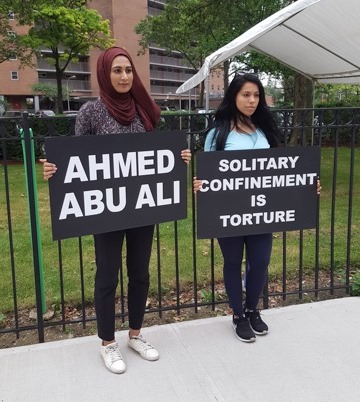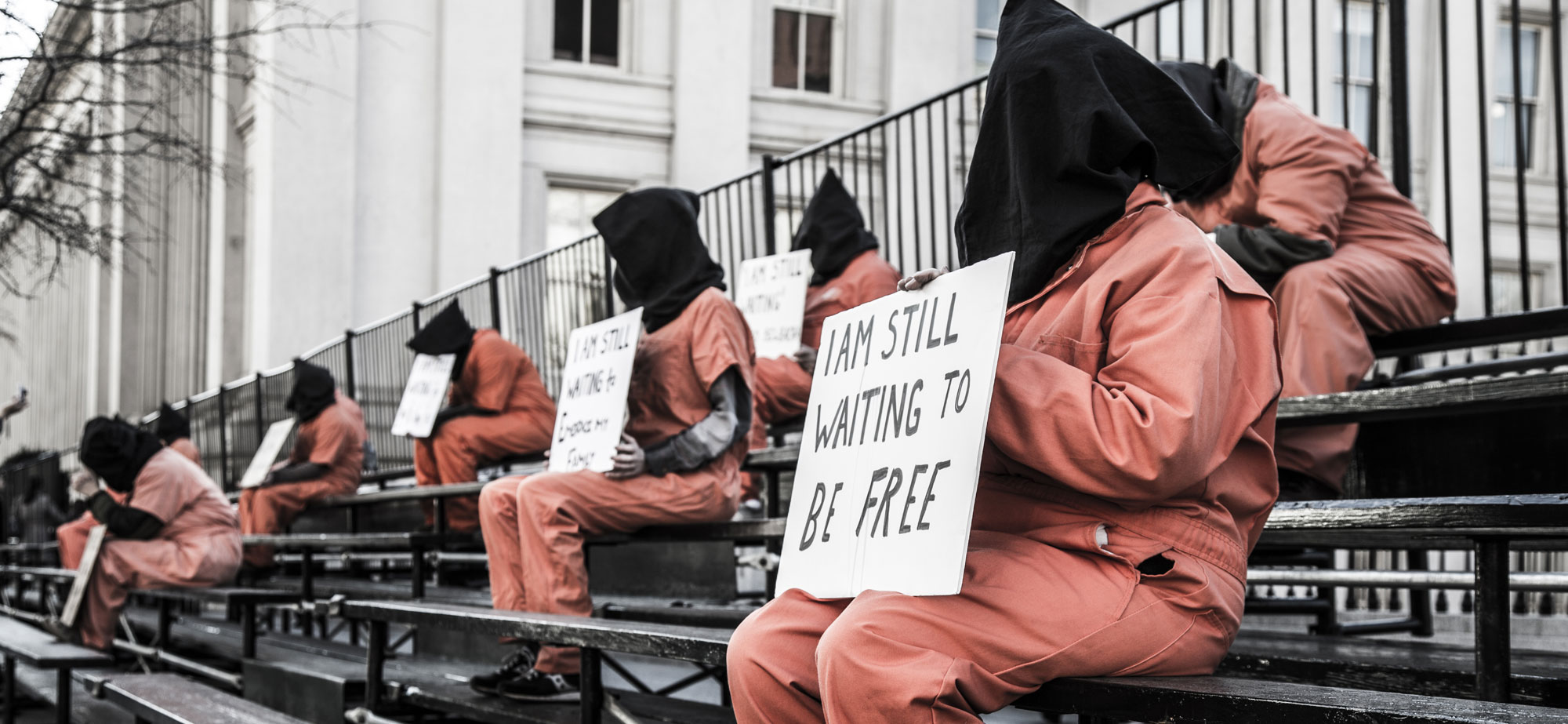In Focus
No Separate Justice: No SAMs

By Jeremy Varon, a member of Witness Against Torture.
Under murky skies at dusk, a small but determined group held vigil on June 5 at the foot of what is perhaps Manhattan’s most monstrous building: the Metropolitan Correctional Center (MCC). The ugly, imposing structure — strangely hidden amidst a thicket of government facilities — is a federal prison. It continues to house “war on terror” suspects under what are among the most inhumane conditions in the United States’s entire penal system.
The vigil was held by No Separate Justice (NSJ), a coalition that includes the Center for Constitutional Rights (CCR), the National Coalition to Protect Civil Freedoms, Amnesty International, the Campaign for Alternatives to Isolated Confinement, and Witness Against Torture (WAT). The focus of the vigil was the use in federal prisons of Special Administrative Measures, or “SAMs.” Shrouded in great secrecy and overwhelmingly used against Muslim inmates, SAMs impose staggering restrictions on inmates’ access to human contact within the prison, to knowledge of the outside world, and to family members. The vigil’s speakers provided both information and a picture of the suffering caused by SAMS. Legal researchers conveyed what little is publicly known of SAMs. Advocates from CCR read heartrending letters from the siblings of Abu Ahmed Ali, incarcerated for years at the ADX “supemax” prison in Florence, Colorado under SAMs restrictions.
The attention to SAMs brought No Separate Justice full circle. The vigils got their start in 2009 to protest the treatment of MCC inmate Fahad Hashmi. A US citizen of Pakistani origin, Hashmi was arrested in England in 2003 on suspicion of material support for terrorism. Extradited to the United States, he faced heavy charges based on an achingly tangential connection to an Al Qaeda operative turned state’s witness. Hashmi was subject to more than two years of SAMs when in pre-trial detention. With his physical and metal health failing from the extreme isolation, he accepted in 2010 a plea deal carrying a 15-year sentence. No Separate Justice started a new round of vigils in 2015. The group continues to highlight his case, as well as other abuses with federal “war on terror” investigations, prosecutions, and imprisonment.
* * *
The June 4 vigil began with chilling reflections from its MC, Abi Hassan. Hassan is a civil rights lawyer working with the Black Movement Law Project. Hassan contended that the United States’ legal and civic infrastructure, much like its physical infrastructure, is collapsing. “Different classes of people” such as the poor, African Americans, and many immigrants, “have different systems of law.” The country has reached a point, Hassan contended, where even upholding the “ideal” of the rule of law appears “antiquated.” SAMs, with their Kafkaesque administration and draconian measures, represent the further chipping away at a proper system of law.
Following Hassan, four recent Yale Law School Graduates (Andrew Walchuck, Tasnim Motala, Andy Udelsman, and Allison Frankel) glossed summarized the major findings from their years of research on SAMs. Created in 1996 to deter the potential criminal plots of prisoners, SAMs metastasized after 9/11. These measures prohibit nearly any direct human contact whatsoever with the prisoner, while greatly censoring trickles of reading material (Barack Obama’s Tales of My Father was in one case banned, for fear that it would disrupt order within the prison). Infrequent phone calls are permitted, only to immediate family. Crucially, SAMs impose gag orders on the inmates, their attorneys, and family members. As a result, little is known about SAMs themselves and any public advocacy for the inmates is severely hampered. Last, SAMs are often applied in pre-trial detention and may therefore be used coercively. A prisoner may well accept a plea deal in hopes that the SAMs will then be lifted.
To obtain critical documents for their research, the legal team had to sue the US government for violation of its obligation to properly release material in response to Freedom of Information Act requests. After four years the researchers were finally handed nearly 1,000 pages of documents. At the vigil, the Yale team enumerated constitutional objections to SAMS. The measures potentially violate: equal protection, given their discriminatory application against Muslim prisoners; the First Amendment, in both their restrictions on the speech of inmates and attorneys and limits on religious liberty (Muslims prisoners, eg, are denied group worship); and prohibitions on cruel and unusual punishment, in light of the devastating effects of this severe form of solitary confinement. The law school grads concluded their presentation with the key recommendations of their report; prepared in conjunction with CCR, it will be released in a month of so. It calls for an end to SAMs and, failing that, greater government transparency about their use and the lifting of SAMs gag orders.
The greatest emotion of the vigil came when letters from the siblings of Abu Ahmed Ali were read. He was arrested in Saudi Arabia in 2003. Age 22, he was studying at university. After torture and 47 straight days of interrogation, Ali signed a “confession” to criminal activity. This “confession” played the key role in his conviction in the United States for material support for terrorism and related charges. He was initially sentenced to 30 years, though the judge conceded that no person was harmed by his alleged actions. On government appeal, his sentence was then extended to life in prison. He has been under SAMs for 11 years.
Abu Ahmed Ali’s brother and sister testify in their letters to the terrible effects of SAMs. Their mother keeps permanent vigil by the phone in anticipation of his short, unscheduled, and infrequent phone calls. His remote detention in Florence Colorado makes visits extremely difficult. He can never hear the voice of extended family, such as in-laws.
No Separate Justice speaks out for true equality under the law. Sadly, the SAMs are but one example of the separate standard of justice now being applied in domestic “war on terror” prosecutions and detentions. The collapse of the rule of law, Abi Hassan stressed at the vigil’s start, is not due to neglect but is instead an act of will. Only with our persistent courage and defiance can the ideal of equality under the law — always badly compromised in the United State’s checkered history— be given new life.



Join us on social media